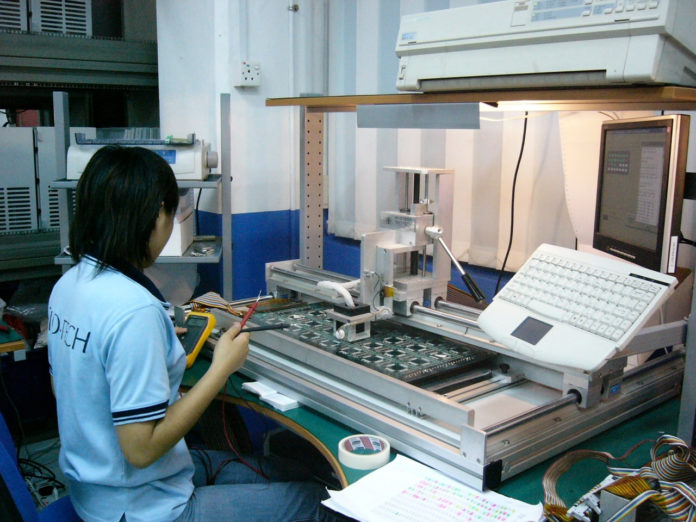Having survived a near-death experience after losing its major customer three years ago, Trio Tech International Inc. has finally returned to profitability, riding a surge of business for chip makers.
For shareholders of the small Van Nuys manufacturer of semiconductor burn-in and test equipment, it’s been a dose of long-awaited good news that sent the company’s share price to above $6 last month – its highest level since April 2008 – before settling back down last week amid profit taking.
But for Trio Tech executives, the last three years of losses have been a bitter lesson in the pitfalls of tying the fate of the company closely to a highly volatile industry – and especially the fortunes of one giant industry player, Advanced Micro Devices. They are trying to diversify into other industries, setting their sights on the automotive sector and the burgeoning solar panel industry, among others.
“We are trying to find sources of revenue that are not as cyclically sensitive as semiconductors,” said Trio Tech Chairman Charles Wilson.
But branching out into unfamiliar industries is hard work, especially as the company has had to scramble to cut costs and staff. That has been compounded by the fact that while the company is headquartered in Van Nuys, almost all of its operations and current customers are in Southeast Asia.
Trio Tech has seven plants employing roughly 1,000 people in China, Singapore, Malaysia and Thailand; the company has only one small test plant next to its Van Nuys headquarters, employing about 15 people.
Chief Executive S.W. Yong, who is based in Singapore, spends most of his time in Southeast Asia. He comes to the United States about three or four times a year; the rest of the time he communicates via e-mail and telephone with Wilson and other executives in Van Nuys.
Yong has spent much of the last year meeting potential customers and making sure the company has all the required technical certifications to enter new industries.
“The biggest difficulty is the networking and the contacts and actually getting the customers,” said Yong in a telephone interview from his Singapore office. “People have to know your company and that you can do the work.”
Trio Tech’s sales and marketing team has had some success in roping in new clients. The company has signed up several U.S. and European automakers doing business in China, and recently inked a deal with the government of Singapore to integrate semiconductor burn-in technology into solar panels. The company has even entered into some real estate deals in China.
About 30 percent of its revenue now comes from sources outside the semiconductor industry, with the goal to make it more than half.
Riding the cycle
It’s been quite a leap for Trio Tech, which started out in the late 1950s testing hermetically sealed computer chips using a centrifuge process. After a few years, the company started making equipment for the testing or “burn-in” of semiconductor chips. The burn-in process involves exposing chips to high temperatures or voltage before they are inserted into electronic components to ensure that the chips can operate as the electronic devices heat up after extended use.
In the late 1970s, the company set up its first plant in Singapore, as many semiconductor industry players were setting up shop in that region to take advantage of the cheaper labor rates.
In the early 1980s, Trio Tech became a subcontractor to Advanced Micro Devices, a giant chipmaker based in Sunnyvale. Eventually, Trio Tech’s work for AMD grew to represent more than 50 percent of its revenue stream. And the company’s revenue rode the same roller-coaster as the semiconductor industry.
Trio Tech’s latest downhill slide started in 2007 as demand for chips started falling. Then, in mid-2008, disaster struck: AMD – then still more than 50 percent of Trio Tech’s revenue base – gave 30 days notice that it was terminating its contract with the company.
“We had to cut costs across the board,” Yong said.
In the next 90 days, Trio Tech laid off about 40 percent of its nearly 1,000-person work force. For those workers that remained, Trio Tech cut its traditional annual bonuses (typically one month’s extra pay). The cuts were spread around so that the company didn’t have to shutter any of its Southeast Asia plants.
Trio Tech wasn’t alone in taking hits from the semiconductor downturn. Of the dozen or so of its direct competitors prior to 2007, only four survive, Wilson said. Some shut down completely; others got bought out by bigger players.
Mergers and acquisitions have been roiling the entire industry as the market for semiconductors contracted with the economic downturn.
“Over the last couple of years, there’s been a tremendous amount of consolidation in the semiconductor sector,” said Li-Wen Zhang, research associate with Pacific Crest Securities in Portland, Ore.
Chip upturn
Of course, when chip makers consolidate, that means fewer customers for companies like Trio Tech that depend on the industry, which lent even more urgency to the company’s diversification efforts.
“In today’s environment, there’s considerable risk to a semiconductor’s financials if they don’t diversify,” Zhang said.
Earlier this year, the tide finally began to turn in the semiconductor industry as orders started increasing. Major U.S. companies that had been stockpiling cash began spending on technology upgrades, prompting chip makers to ramp up production lines.
This has led to a jump in orders for Trio Tech’s burn-in equipment. The company has hired back workers to precrisis levels and even opened two plants. Meanwhile, despite the industry trend toward consolidation, there are no plans in the near term to sell the company.
“Our position is to grow the company to much more of a capability and maybe at some point in future look for offers,” Wilson said.
BUSINESS: Semiconductor test equipment
HEADQUARTERS: Van Nuys
CEO: S.W. Yong
MARKET CAP: $19 million
DIVIDEND YIELD: N/A
P/E: N/A

